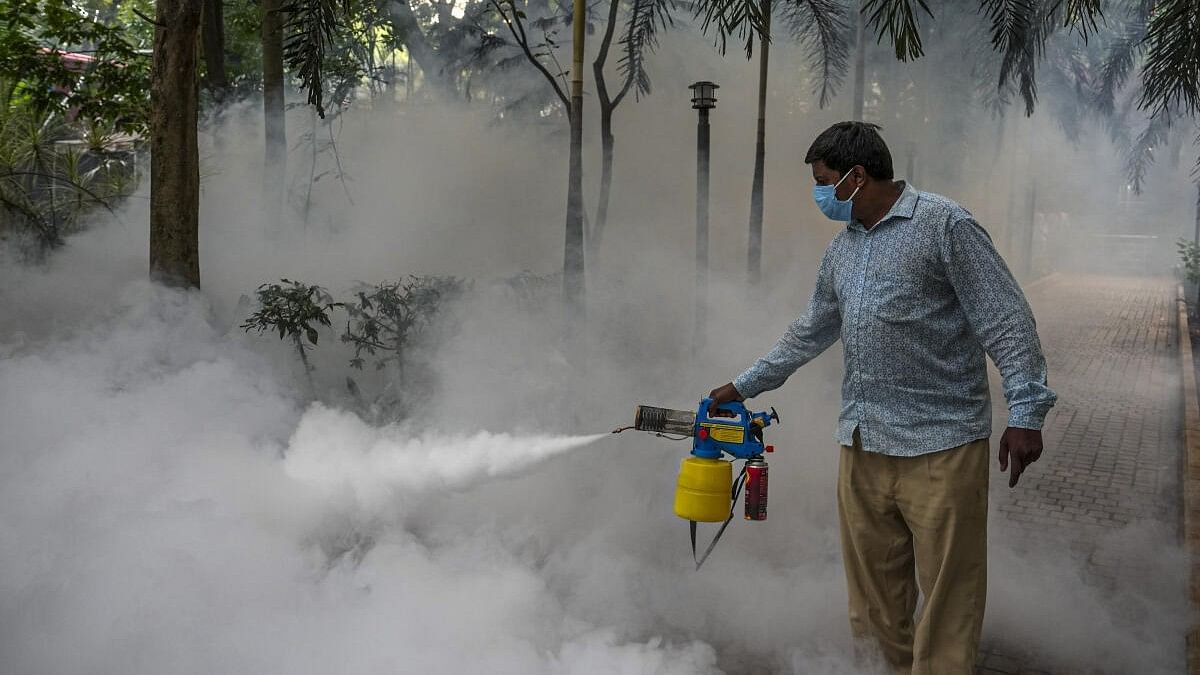
A municipal worker fumigates a park in a bid to kill mosquitos off amidst reports of highest dengue cases in the city, in Bengaluru.
Credit: PTI Photo
Bengaluru: Hospitals are seeing a rise in patients who come in with dengue-like symptoms but are negative when tested, according to doctors, who suspect early tests as one of the reasons for the confounding development.
Dengue is characterised by symptoms such as sudden high fever, pain behind the eyes, nausea, severe headache, joint and muscle pain and rash. Doctors suspect dengue based on symptoms and their severity and collect blood samples for testing when necessary.
According to health department data, the state's government and private health facilities reported over 1.17 lakh suspected cases of dengue as of July 6.
Of these, blood samples of 53,866 patients were collected and 7,006 tested positive for dengue, which is on the higher side compared to 41,635 suspected and 2,432 confirmed cases in the corresponding period last year.
Talking about the development, Dr Sheela Murali Chakravarthy, Director, Internal Medicine, at a private hospital in Bengaluru, said even though patients test negative, their symptoms "closely mimic those of the disease".
One of the reasons, she said, could be the timing of the test.
NS1 or IgM tests could show negative results despite the presence of dengue-like symptoms due to timing of the test in relation to the onset of the infection, individual immune response variations and the specificity of the tests, she added.
Doctors note that dengue NS1 antigen can be detected by the third day after infection, while IgM antibodies are seen by day five. However, a negative NS1 test does not rule out dengue infection.
Dr Aravinda G M, Internal Medicine consultant at another private hospital in the city, said the hospital has seen at least 20 patients daily with dengue-like symptoms for the past two months.
"At least 20 per cent of these patients show negative dengue results. There might be negative reports initially if rapid tests are used and not ELISA, which is the gold standard," he said.
Dengue-like symptoms can be seen in other viral infections as well.
"Not every symptom seen in dengue is indicative of the disease because severity also matters. Many patients might show negative dengue results but we need to closely monitor them because they might have thrombocytopenia (low platelet count) due to other viral infections," Dr Ravi K, head of the Covid-19 Technical Advisory Committee, Karnataka, and also the head of the department of medicine, Bangalore Medical College and Research Institute (BMCRI).
With no specific treatment, dengue symptoms are treated using paracetamol as prescribed by the doctors, adequately hydrating and resting, and closely monitoring platelet levels. If the case is severe, platelet transfusions might be necessary after hospital admission.
Self-medication risks
Doctors are also warning that there is a prevalent pattern of patients resorting to over-the-counter antibiotics and painkillers after dengue tests come back negative, impacting antimicrobial resistance in the long-term.
Dr Carolin Elizabeth George, head, community medicine and research at a Bengaluru private hospital, warned about patients' false associations of viral fevers with antibiotics.
"Many people believe stronger medicines, especially antibiotics, are key to combat illnesses and therefore ask for antibiotics despite there being no bacterial infection. Many times, there is pressure on doctors to prescribe antibiotics even when it is not necessary, and they might also do it to keep patients satisfied," she said.